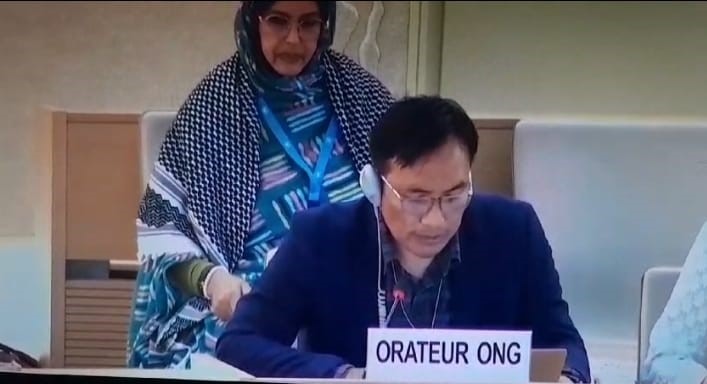Khuraijam Athouba, spokesperson of the Coordinating Committee on Manipur Integrity (COCOMI) has urged the United Nations Human Rights Council (UNHRC) to seek a report from the Government of India on the situation of Human Rights in India’s Northeast particularly Manipur in relation with the ongoing complex situation of armed conflict, cross-border arms and drugs trafficking and illegal immigration. Athouba is also Vice-President of the International Peace and Socail Advancement (IPSA), a constituent organisation of the United Committee Manipur (UCM).
Khuraijam Athouba has given his first deliberation on March 15, 2024 during the discussion Agenda Item 3 of the 55th Session of the UNHRC – Promotion and protection of all human rights, civil political, economic, social and cultural rights, including the right to development, according to a press release issued on March 16 by the Media Coordinator of COCOMI.
The 55th UNHRC session has been started from February 26 and will be continued till April 5, 2024.
The transcript of the statement given by Khuraijam Athouba at the 55th Session of the UNHRC is reproduced hereunder verbatim:
Mr President,
I stand before this esteemed assembly for the second time since last HRC session urgently bringing attention to the pressing human rights issues faced by the Indigenous People of North East region of India, with a particular emphasis on Manipur.
The rich tapestry of human rights, spanning civil, political, economic, social, and cultural realms, including the right to development, is under serious threat in this region. Manipur, nestled in India-Myanmar Border region, is at the epicentre of a complex and multifaceted crisis that requires our collective attention and decisive action of this council.
The indigenous communities in Manipur find themselves at the crossroads of a grave conflict orchestrated by cross-border illicit Drugs trading and terrorist activities. This dire situation has resulted in a systematic violation of their fundamental human rights, undermining the very essence of the right to development, orchestrated by proxy forces created by the Government of India under the disguise of the peace agreement called Suspension of Operations.
The recent report from the UNODC have exposed an alarming surge in the trafficking of narcotic substances and expanding Opium Poppy Cultivation entering the India-Myanmar borderland, bringing with it a host of socio-economic challenges.
The deliberate influx of a large foreign population by drug-cartels has not only disrupted social cohesion but has also created an acute humanitarian crisis, leading to the displacement of indigenous communities.
In light of these urgent issues, I urge the Human Rights Council to seek a report from the Government of India:
-
- On their role in resolving the increasing crisis of unlimited illegal immigration of foreign nationals and cross-border trafficking of drugs and small arms in Manipur and Northeast India from Myanmar.
- On the measures taken to resolve massive deforestation and opium cultivation in the Hill areas of Manipur, particularly in the immigrant occupied territories in Indo-Myanmar border areas.
- To initiate a dialogue to address the root causes of the ongoing conflict.
- On taking decisive action to ensure the protection of human rights for the people of Manipur, who are facing exploitation and violence amid the ongoing crisis.
The Human Rights Council’s intervention is crucial and I implore you to consider these urgent matters and take decisive steps to uphold the principles of human rights.
I thank you.
Khuraijam Athouba will be attending and taking part in several other interventions in the upcoming agenda items with regards to the Human Rights situation faced by indigenous people of Northeast India and the geo-political ramifications faced by the people across the Western South-East Asian region particularly in Indo-Myanmar borderland region, the COCOMI release added.












